Introduction
To win hearts and minds in Afghanistan and Iraq, military experts want U.S. companies to contract with local firms for a variety of tasks like trucking, feeding troops, and providing security. The U.S. government’s “Afghan First” and “Iraqi First” initiatives increasingly seek to rely on local contractors, often through subcontracts, in part to stimulate their local economies.
But a host of investigations underscore the perils in the murky world of subcontracting with foreign firms, and the difficulties in making sure taxpayer dollars are well spent. Among the current and recent probes by the Pentagon, congressional panels, and federal investigators:
- Up to $300 million in subcontracts in Iraq and Kuwait were allegedly tainted by a Saudi-based subcontractor employee’s kickback scheme;
- Subcontracted security forces in Afghanistan are suspected of bribing both Taliban and Afghan government officials;
- U.S. money for a trash collection program in Iraq, administered by a bewildering array of subcontractors, has allegedly ended up in the pockets of insurgents; and
- A former contractor employee alleged that Middle Eastern subcontractors, trying to sway the award of more subcontracts, were sneaking prostitutes into Baghdad’s Green Zone by abusing their security access cards.
A woman’s quest for information on the death of her brother, Lt. Col. Dominic Baragona, reveals the difficulties in holding foreign contractors in Iraq and Afghanistan accountable — even when Americans get killed.
Subcontracting is among the most challenging parts of the U.S. government’s widespread outsourcing of war-related tasks. It works like this: A government agency — most likely the Defense Department, State Department, or U.S. Agency for International Development — will award work to a “prime” contractor. That prime contractor, usually a large American company like Kellogg, Brown and Root (KBR) or DynCorp International, will often subcontract some or even a majority of its work to other companies, including foreign-owned firms. Those subcontractors sometimes then turn around and subcontract part of the work, and so on.
“There are good reasons for using subcontractors,” said Christopher Shays, a former Republican lawmaker who is now co-chair of the congressionally created Commission on Wartime Contracting. “Business economists tell us that subcontracting can help businesses tap into specialized skills, configure their organization to meet changing needs, and adjust to shifts in demand.”
Subcontractors do everything from providing translators for American soldiers to trucking supplies into war zones, as well as building military bases and providing security. Without foreign subcontractors, U.S. troops could not operate halfway around the globe.
But in footing the bill for all this work by a network of companies, the U.S. government often doesn’t know who it is ultimately paying. And that can lead to fraud, shoddy work, or even taxpayer funds ending up in the hands of enemy fighters.
“What makes sense for a renovation project in Connecticut or Maryland can create some unique risks when the contractor is hiring subcontractors in a combat zone halfway around the world,” said Shays.
Prosecuting Subcontractors Difficult
The problem isn’t new. Three years ago, Democratic Rep. Henry Waxman of California said the subcontracting world “is so murky that we can’t even get to the bottom of this, let alone calculate how many millions of dollars taxpayers lose in each step of the subcontracting process.”
Compounding the abuses are the difficulties in holding companies accountable. The Defense Department’s management of contractors has been on the non-partisan Government Accountability Office’s “high risk” list since 1992, but the challenges are even greater when foreign companies are working under a subcontract.
“Without good subcontract control by prime contractors and good oversight by the government,” said Michael Thibault, co-chair of the Wartime Contracting Commission, in a press release, “we risk not only wasting money, but also depriving our troops of support they need, overlooking misconduct that alienates local populations, and even handing funds to violent insurgents.”
It’s also difficult for the United States to prosecute citizens of other countries for fraud or corruption. Cooperation with foreign law enforcement is essential, but often “they don’t take this as seriously as we do,” a Pentagon criminal investigator told the Center and the Fund.
Prosecutions often rely on whistleblowers inside a company to report suspected fraud. But whistleblower protections typically do not extend to subcontractors’ employees. Furthermore, many foreign subcontractors do not feel the need to cooperate with U.S. law enforcement or auditors.
Tamimi Group: Where’s the Money?
Take the Saudi-based Tamimi Group. After a four-year criminal investigation, the United States is unable to determine how Tamimi’s top manager for Iraq and Kuwait obtained at least $133,000 to bribe KBR employees for subcontracts. In 2006, Mohammad Shabbir Khan, a Tamimi manager and naturalized U.S. citizen, pleaded guilty in the U.S. on 14 kickback-related charges and sentenced to 51 months. He was convicted on two other counts of witness tampering in 2009. He admitted to paying $133,000 to an American KBR employee to win $21.8 million in subcontracts to supply food to troops in in Iraq and Kuwait.
Tamimi has refused to turn over its financial records to the Defense Contract Audit Agency and to prime contractor KBR, which want to examine the company’s books to pinpoint how Khan obtained the money for the bribe, according to Charles Tiefer, a member of the Wartime Contracting Commission. There could be as much as $300 million in “tainted subcontracts” linked to the kickback scheme, including $49 million with just Tamimi, Tiefer said at a July hearing by the commission.
Perry Dalby, Tamimi’s ethics director, said the company was not required by the terms of its contract to supply the records sought. “What happened with Mr. Khan was a terrible thing,” Dalby said. “The company itself did not profit or did not gain any awards as a result.” Tamimi, he added, “cannot find where we are missing $133,000.”
Even a seemingly simple question — how much money goes to foreign subcontractors annually — has no clear answer because of the complex contracting chain.
Edward Harrington, an Army procurement official, could not tell the Wartime Contracting Commission hearing in July how much the Pentagon spent on foreign subcontractors, saying he could only estimate it was “likely in the lower billions of dollars.”
The State Department and U.S. Agency for International Development likewise did not know how much they spend on foreign subcontractors. USAID’s Drew Luten told the commission that the problem may get worse with the U.S. government’s Afghan First effort to steer more money to local companies.
Video of Subcontractors Gone Wild
A homemade video allegedly taken at a subcontractor-organized party in March 2005 is another example of what some dubbed the “Wild West of contracting” in Iraq, where U.S. taxpayer dollars flow freely with few checks on spending that often leads to waste, fraud, and questionable behavior. A copy of the video was obtained by the Center. While music plays in the background, the brief video shows two women laying over the laps of three Western men who wear tan-colored vests, clothing common to civilian contractors in Iraq.
“It was common practice for subcontractors to provide prostitutes at these parties” inside Baghdad’s Green Zone, the source of the video said in a 2007 interview with investigators from the Defense Criminal Investigative Service (DCIS). The whistleblower also gave government investigators short clips of video taken at one of the parties. The interview documents and the video were made available to the Center and the Fund on the condition that the whistleblower’s name would not be revealed.
Investigators from the FBI, the DCIS and the Department of Homeland Security interviewed the whistleblower over several years beginning in 2005, according to the documents. The investigation, which a Pentagon source says is ongoing, focuses on alleged subcontractor kickback schemes for Iraq reconstruction contracts awarded by the Air Force Center for Engineering and the Environment in San Antonio.
The whistleblower “cited the issuance of [common access cards] to Middle-Eastern contractors as contributing to multiple problems, including the provision of prostitutes to U.S. government and U.S. contractor personnel,” according to a DCIS interview report obtained by the Center.
Among those who attended contractor-sponsored weekly parties were “contracting officers, captains and majors and civilians in the J-7,” which is the engineering staff of the Multinational Security Transition Command in Iraq, according to a July 2005 FBI report with the same source.
Possession of a security access card allowed a contractor to escort up to five people into the Green Zone without having his automobile searched, the DCIS interview report said. “This is how [a Middle Eastern reconstruction contractor] managed to routinely have prostitutes at their parties,” the whistleblower alleged in the report.
In the case of that contractor, the prostitutes were young Iraqi women, according to the whistleblower’s account given to the FBI, and were “generally dressed in what he described as ‘belly-dancer’ outfits.”
A manager for the contractor did not respond to an e-mailed request for comment.
Other allegations accuse Iraqi contractors of similar abuses. The Baghdad-based Organization of Women’s Freedom in Iraq, in a report issued in March, detailed two operations where Iraqi women were allegedly provided to U.S. military personnel for money. In one case, it was an Iraqi translator who “brought different girls for the US officer on every visit and let him use his own bedroom.” The other instance involved an Iraqi who “has a badge for access to the nearby American military base who are the main clients,” similar to the other allegation of security card abuse in the Green Zone.
The U.S. military “does not condone” prostitution, a military spokesperson said in an e-mailed statement to the Center and the Fund. “Prostitution is illegal for members of the force and counter to military values. United States Forces – Iraq investigates allegations of Service Member misconduct when they arise and follows with appropriate action based on the particular facts of any given situation.”
Prostitution can give the mission a “terrible black eye,” said Steven Cullen, a former JAG Corps attorney, because success hinges on the U.S. government building a good relationship with the local Islamic communities. “Contractors abusing local girls could get people killed,” Cullen said referring to U.S. troops, contractors, or the girls themselves, “or at least cause people to stop cooperating with us.”
According to U.S. intelligence agency translations of jihadi websites, some insurgents have tried to spread propaganda about Iraq women being prostituted on U.S. military bases.
For example, a jihadi website article in September 2007 names an Iraqi, who according to the article, was “a supplier of prostitutes to the American forces.”
The article was based on information “allegedly from a former Iraqi translator who ‘had worked for the US forces, then repented and promised to post names of US informers in Iraq,’” according to the translation by the Office of Director of National Intelligence’s Open Source Center.
Fool Me Twice?
Foreign subcontracting can also mean greater risks for U.S. troops and personnel.
USAID funds intended for Iraqi trash collection as part of its now-shuttered $644 million Community Stabilization Program were “being extorted by at least one known militia leader,” with “adverse consequences” for American troops, according to a 2008 USAID Inspector General report. The program to improve community services was run by an American non-profit group, International Relief and Development, which in turn hired Iraqi subcontractors.
“Evidence in USAID’s report suggested that similar problems may exist elsewhere in Iraq,” said Stuart Bowen, the special inspector general for Iraq reconstruction. A U.S. policy “specifying that local contractors receive priority consideration for contracts” increases the risk of fraud, he told a House oversight committee in June.
The Pentagon’s Iraqi First program, launched in 2006, sought to expand subcontracting to Iraqis as a way to create jobs and build good will. The program inspired a similar Afghan First program. But with no reliable databases about local contractors, “the vetting process presents a very real and difficult problem, especially at the subcontractor level, Bowen said.
Similar problems have been noted with subcontractors in Afghanistan hired to provide security for supply routes and construction sites.
Raymond DiNunzio, the head of investigations for the Special Inspector General for Afghanistan Reconstruction, said that in some cases involving reconstruction projects, “without performing any subcontract work, Afghan-owned companies have absconded with initial startup fees only to re-emerge under new identities to repeat the fraudulent scheme.”
Perhaps more seriously the U.S. government “does not have the ability to monitor Afghan security contractors or determine the nature of their affiliation or allegiance,” DiNunzio said.
DiNunzio was referring to a problem dubbed “Warlord, Inc.” by the House oversight subcommittee on national security. It found many private security subcontractors were warlords, strongmen, commanders, and militia leaders who compete with the Afghan central government for power. Their interests “are in fundamental conflict with U.S. aims to build a strong Afghan government,” according to a subcommittee report. Some subcontractors are suspected of bribing the Taliban not to attack trucks on certain routes, while other bribes flow to Afghan government officials, further fueling corruption, the report said.
Solutions?
Experts say some simple measures could help separate the minority of bad subcontractor companies from the majority of honest ones.
“Photographs, fingerprints, or retina scans would provide a reliable identification mechanism and prevent corrupt Afghans from securing repeat reconstruction business,” says DiNunzio, the U.S. reconstruction investigator. The State Department already does this with its local and third-country contractor employees. It matches the biometric data with U.S. databases at the FBI and Defense Department “to ensure that contractor and subcontractor employees are not a risk to the public trust,” said Cathy Read, a State Department official.
Another proposed solution would require prime contractors like KBR or DynCorp to share names of blacklisted subcontractors and terminated employees with the government to create a centralized database of questionable companies and individuals.
Even some companies that have been subcontractors have agreed with the concept. “As a small business, any tool that we have that could help us identify those bad apples, if you will, we would welcome,” said Mark Krens, the chief financial officer at The Diplomatic Group, a subcontractor to Fluor.
This piece is a collaboration between the Huffington Post Investigative Fund and the Center for Public Integrity.





Join the conversation
Show Comments